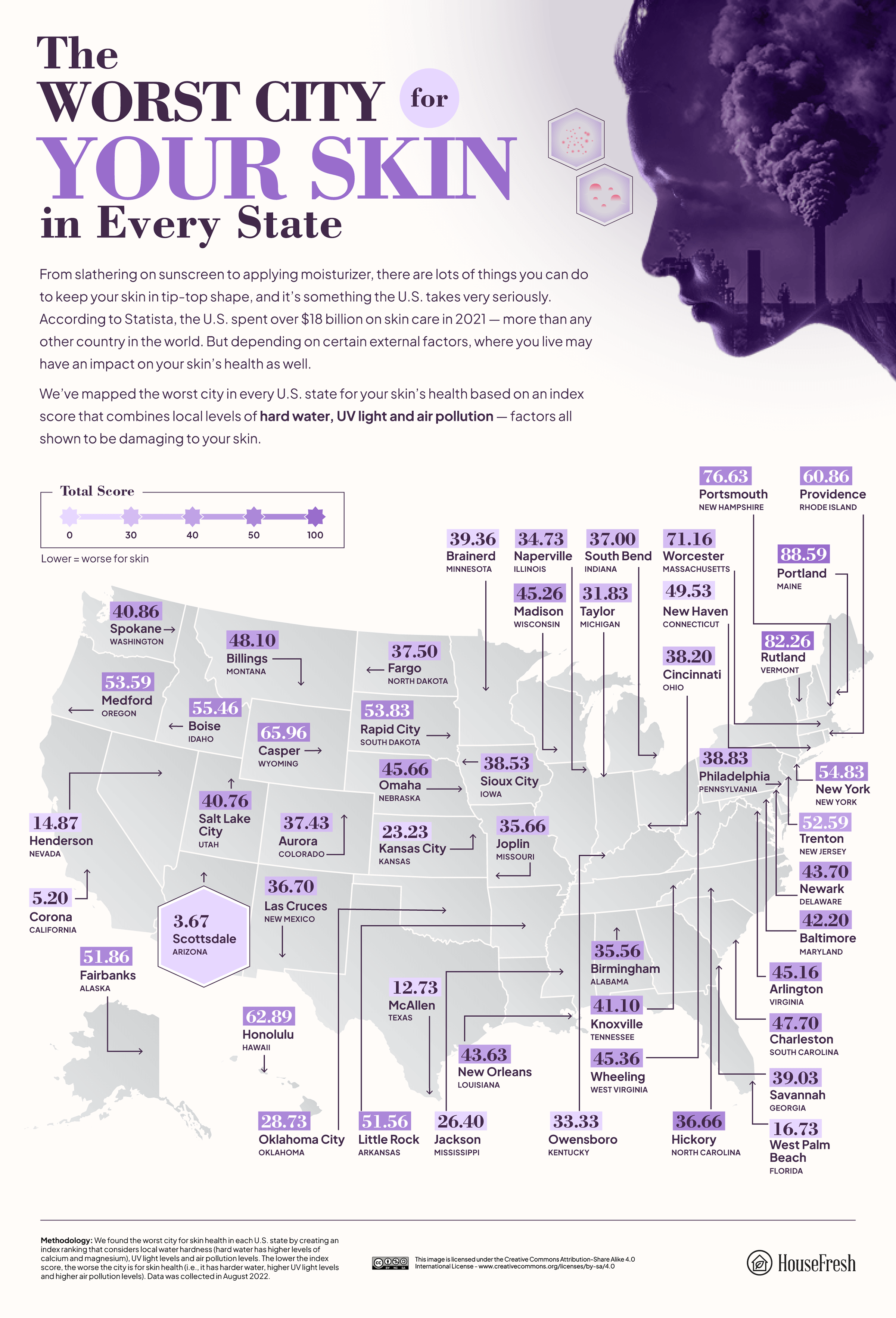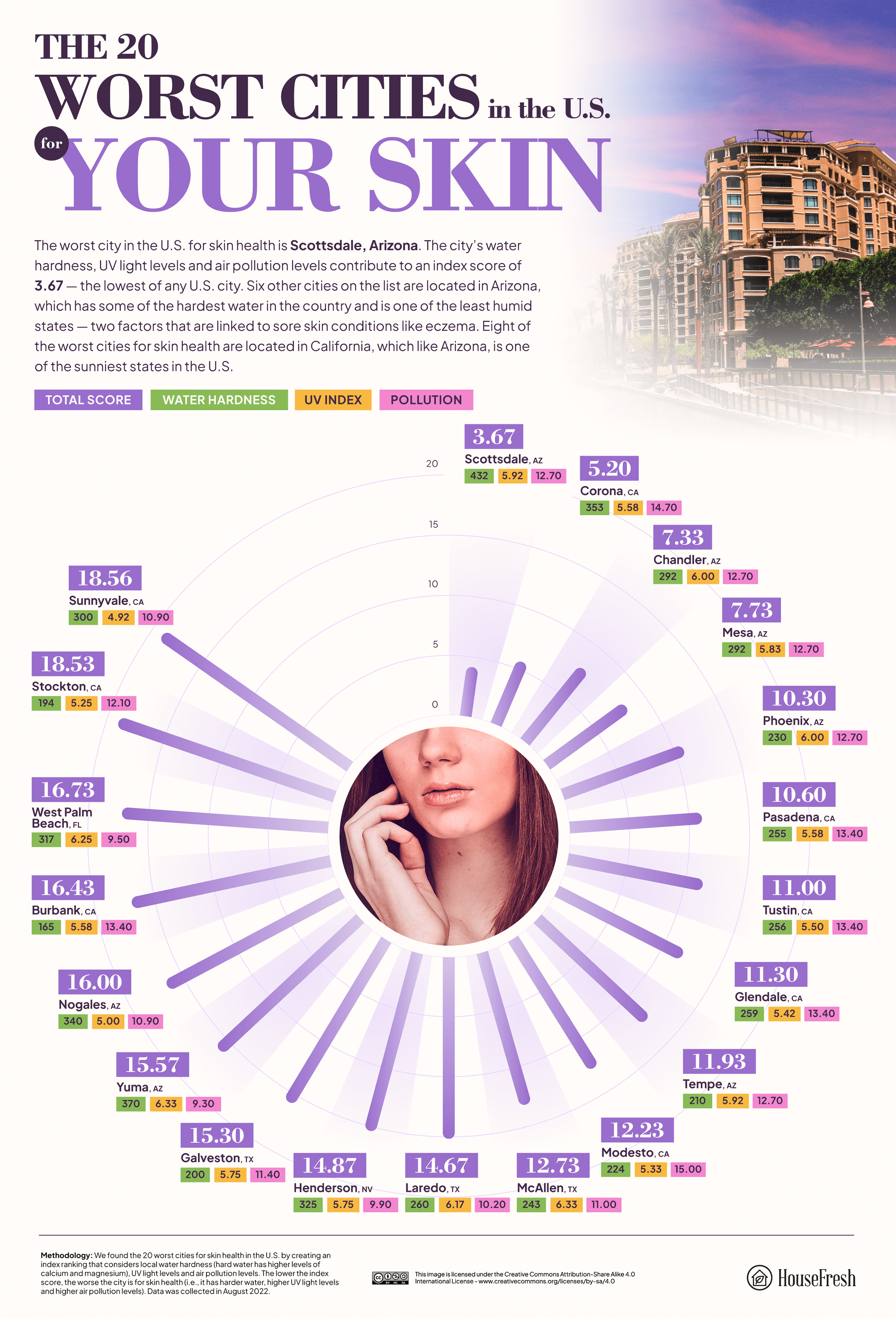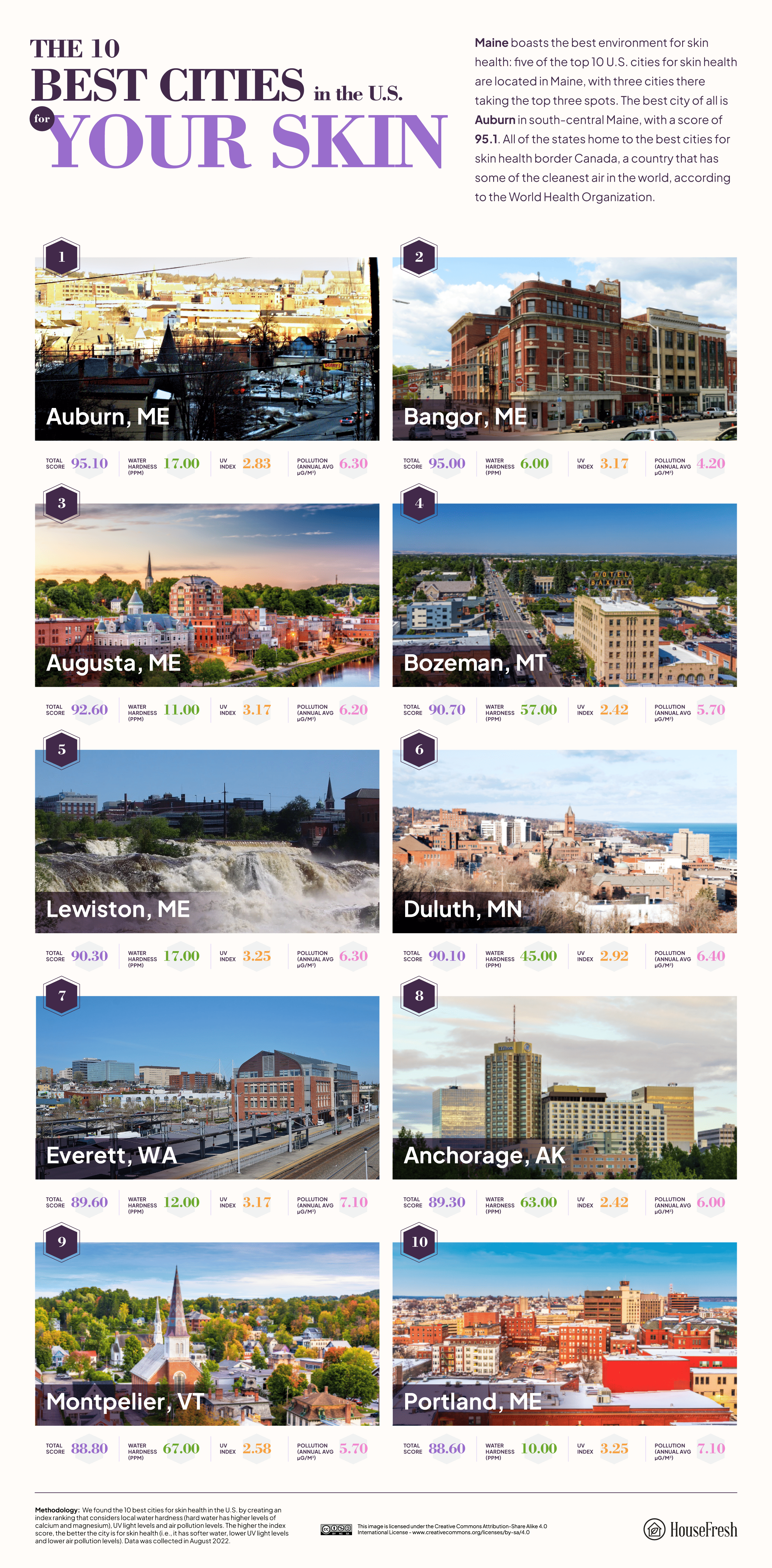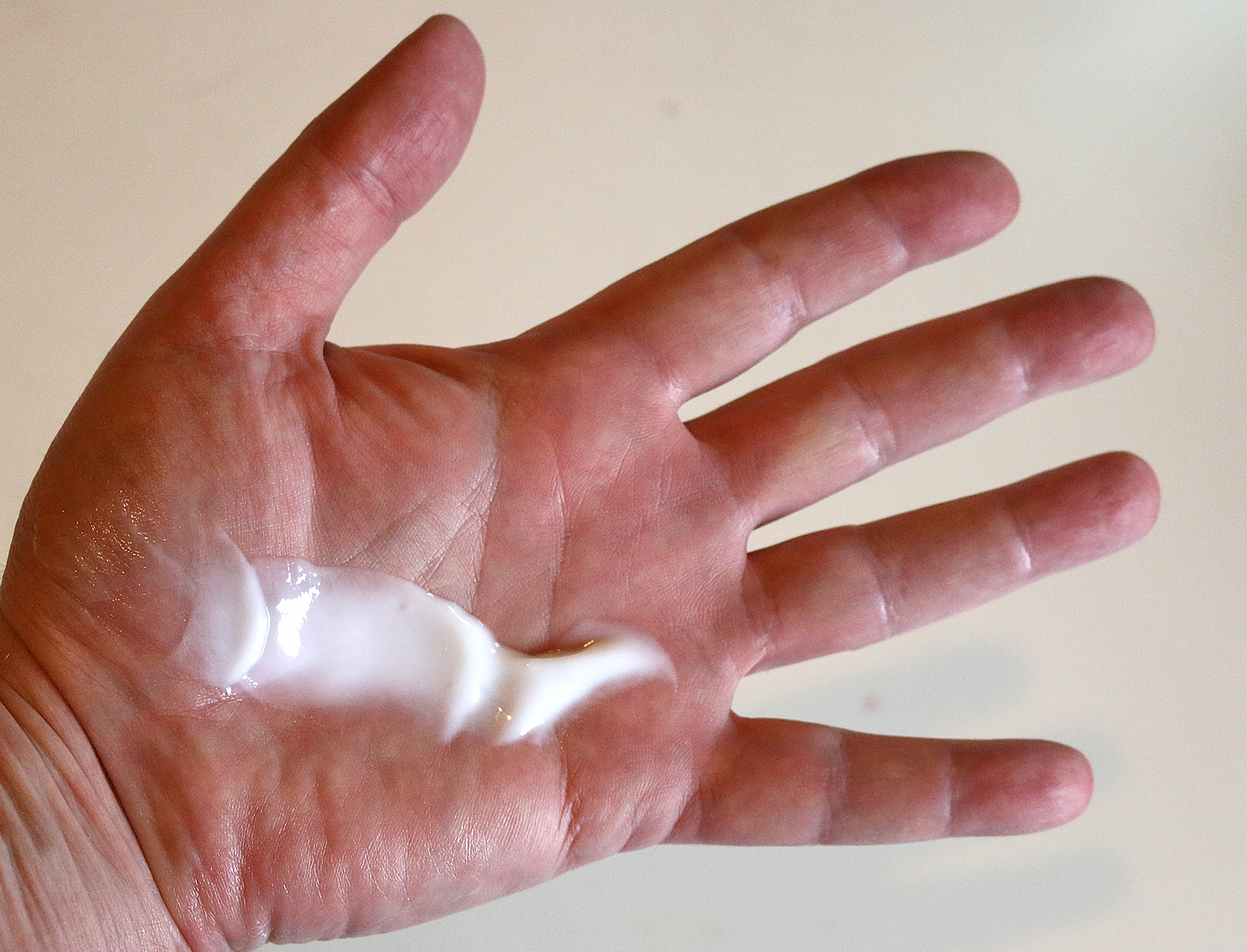Do you remember when kids would tease other kids by pointing at them and warning them that their epidermis was showing? Well, although that warning may have been in jest, some truth to it may be warranted due to the fact that some of our skin is constantly exposed to the elements and are affected by them as a result — especially depending on where you are located…
The Best and Worst Cities for Your Skin In the United States
…but where are the best cities and the worst cities for your skin in the United States?
To find out the answer to that question, data pertaining to air pollution was taken from the Air Quality Data by the Environmental Protection Agency of the United States; and the State of the Air report by the American Lung Association. A higher value represents more air pollution.
The UV Index Scale is a standard measurement of the strength of sunburn-producing ultraviolet radiation at a particular place and time. Usually ranging from 0 to 11 — higher = more ultraviolet radiation — an average figure was taken for each city in the United States across all the months of the year. UV index data was sourced from WeatherUS and WeatherWX.
Water hardness is measured in parts of calcium carbonate per million, with higher values signifying harder water and lower values signifying softer water. Data was collated from Hydroflow-USA.
Where possible, city-level data was used; however, where data was not available at city level, metropolitan area level estimates or county level estimates were used instead. The final list of cities includes 328 cities, for which all three data points were available.
Each of the above metrics was given a weight of 33.33 to add up to 100 total; and each city was scored on its air pollution, UV index, and water hardness, with higher scores indicating being better for skin and lower scores being worse. High-scoring cities are places with cleaner air, less ultraviolet radiation and softer water. Cities with lower scores have higher pollution levels, more ultraviolet radiation, and harder water.
The data was collected in August 2022.
This article written by Danny Ashton for HouseFresh gives more details about which cities in the United States are the best for your skin and which cities in the United States are the worst for your skin; and I have been given express written permission to use the maps and the verbatim text from the aforementioned article in this article. While HouseFresh has endeavored to ensure the information provided is accurate and current, it cannot guarantee it. Neither HouseFresh nor The Gate accept any liability — and assume no responsibility — for any and all information which is presented in this article.
With that disclaimer out of the way, here is the article.
Which Are the Best and Worst Cities for Your Skin In the United States?
We’ve all had those days where our skin is not looking its best, despite doing all the right things to keep it happy and healthy. Lots of things can affect our skin from the inside out, like hormonal changes and health conditions, but if you’re having trouble with your skin, it might also be down to some environmental factors at play where you live.
Unhealthy levels of air pollution, for example, still affect more than 40% of Americans, despite great strides made by the U.S. government since the Clean Air Act of 1970. And while you might be aware that air pollution can cause a range of health problems when inhaled, did you know that it can also cause the skin to age prematurely and worsen conditions like eczema?
Air pollution is not the only environmental factor affecting your skin. Hard water (water with high levels of dissolved calcium and magnesium) and UV light from the sun are also proven to cause skin damage, with health problems resulting from exposure ranging from dry and itchy skin to skin cancer.
From city to city, individual measurements of air pollution, hard water and UV light will vary — but where in the country can you find the very worst skin health conditions based on all of the factors combined?
What We Did
To find out which cities have the harshest effect on the skin, HouseFresh gave 328 U.S. cities a score for skin health. To create the index score, each metric (air pollution, UV light and water hardness) was given a weight of 33.33 to add up to 100 total.
Cities that were awarded high scores boast cleaner air, less UV radiation and softer water. Cities with lower scores have higher pollution levels, more UV radiation and harder water – and are subsequently worse for the skin.
Key Findings
- Scottsdale, Arizona, is the worst city in the U.S. for skin health.
- The best city in the country for skin health is Auburn, Maine.
- Cities in Arizona and California are among the worst for skin health.
- Maine and five other states bordering Canada are home to the best cities for your skin.
The Worst City For Your Skin in Every State
We’ve given each U.S. city in our analysis an index score based on local levels of hard water, UV lightand air pollution, with lower scores indicating that the city is worse for skin health. The map below reveals the lowest-scoring city in each state. The worst cities in the country include Scottsdale, Arizona(3.67), Corona, California (5.20), and McAllen, Texas (12.73).

Skin health is important to many people in the U.S. One 2022 poll revealed that over half of Americans feel confident on a day when their skin feels and looks its best — which is probably one reason why the U.S. spends billions of dollars annually on skin care products.
Arizona and California Are Home to the Worst Cities for Your Skin
Our research reveals the 20 worst cities in the U.S. for your skin based on local levels of hard water, UV light and air pollution. Scottsdale, Arizona, takes the top spot with an index score of 3.67, which is lower than any other city in the U.S. Unfortunately for Arizonans, six different cities in the state also feature in our ranking, including Phoenix, but what makes the Grand Canyon state so unfriendly to your skin?
Not only is Arizona the sunniest state, exposing residents to high levels of UV light all year round, but it also scores poorly on air pollution levels. Inside the home, Arizona has some of the hardest water in the U.S., and residents spend more on air-conditioning — which can dry out the skin — to combat the high temperatures than anywhere else in the country.

Eight cities in California also feature in our ranking of the worst U.S. cities for skin health. Like Arizona, California has the honor of being one of the sunniest states as well as one of the least humid. Not only is humidity essential for keeping your skin hydrated, but research has shown that low levels of humidity in the air can cause wrinkles to form.
Maine and Other States Bordering Canada Are the Best for Skin Health
According to our research, the kindest city on the skin is Auburn, Maine, with an index score of 95.1, followed closely by Bangor, also in Maine, with a score of 95. Five Maine cities appear in our top 10 rankings, including the state’s capital Augusta (92.6) and the worst-scoring city in the state (Portland: 88.6) still scores higher than the highest-scoring cities in 44 other states.
One factor behind Maine’s magic is that it boasts soft water, which lacks the high levels of minerals in hard water that can leave a residue on your body and cause dry and irritated skin. Another reason is that it is one of the most humid states, which can help to keep skin hydrated. Maine’s clean air is also a bonus, as high levels of air pollution can prematurely age the skin by causing wrinkles and age spots.

Every other city in our top 10 rankings is in a state that borders Canada. While Canada has some of the cleanest air in the world, the border region between Canada and the U.S. has enjoyed a reduction in annual ozone levels in recent years thanks to an ongoing agreement between the two countries.
Some of these states are also among the cloudiest in the country, but it’s a myth that sunlight can’t cause damage to your skin on cloudy days. While clouds do block some of the harmful UV rays from the sun, they don’t block it all and that’s why experts recommend wearing an SPF 30 or higher sunscreen every day.
The Best and Worst U.S. Cities for Your Skin
Explore our table below to find out if your city ranks as one of the best or one of the worst places in the U.S. for skin health based on an index score that combines local levels of hard water, UV light and air pollution. The lower the score, the worse the city is for skin health.
How Hard Water, UV Levels and Pollution Levels Affect the Skin
Did you know that your skin is your body’s largest organ? It’s also the most visible indicator of your age, which is why protecting yourself against the premature aging effects of UV light and air pollution is so important. These aging effects include yellowed and bumpy skin, wrinkles and age spots.
Too much exposure to UV levels can cause more dangerous health problems to develop, like skin cancer. In fact, getting five or more sunburns in your life more than doubles your risk of developing melanomaand your skin can be damaged by UV light even without an apparent burn.
Luckily, it’s relatively easy and inexpensive to protect yourself from skin damage caused by either UV light, hard water or air pollution. Read on for a breakdown of each factor’s harmful effects up close and for our tips on how to protect your skin’s health like a pro.

Take Care of Your Skin Wherever You Live
To some people, the phrase “skincare routine” will conjure up convoluted images of cucumber slices, chemical peels and Patrick Bateman’s iconic morning ritual. In reality, taking care of your skin doesn’t have to be complicated or expensive and the benefits you’ll reap are worth the extra time you invest.
One easy thing you can do is cover up in the sun and wear an SPF 30 or higher sunscreen every day, even when it’s cloudy. Studies have shown that even applying an SPF 15 sunscreen daily reduces your risk of skin cancer by 40%.
Wherever you live in the country, and whatever your skincare routine, take care of your skin as best you can and make a note of anything out of the ordinary. If you have any skin concerns or notice any changes to a mole, speak to your doctor or a dermatologist.
Final Boarding Call
Although I do like going to the beach and being in the water, I have never liked sunbathing. Tanning my skin was never important to me. Also, I almost never wear shorts instead of jeans; and the parts of my skin which are usually exposed are my face, arms, and hands — so my skin rarely gets sunburnt.
Do what you can to ensure that your chances of contracting skin cancer are as low as possible…
Photograph ©2022 by Brian Cohen.

